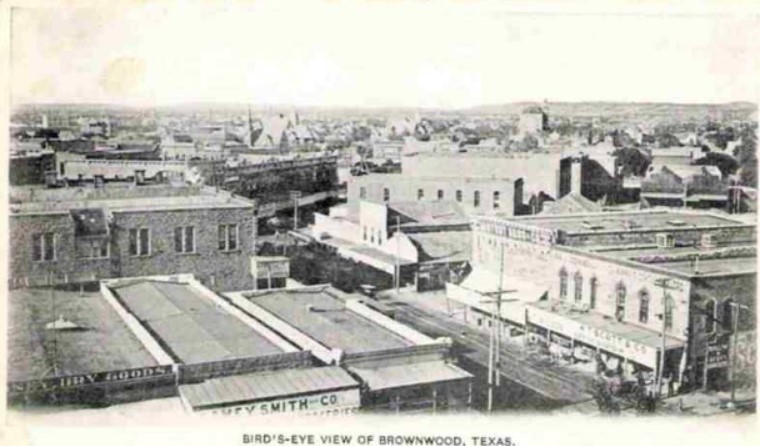I found this little glimpse into life in Brownwood at the turn of the 20th Century. Texas Author Boyce House, who spent some of his growing up years in Brownwood during the early 1900s, was once asked to write about his recollections of the town for the Texas Literature Club of Brownwood High School. His response reads like something out of It’s a Wonderful Life, or the childhood recollections of Garrison Keillor, rather than tales of the untamed frontier–which Brownwood was, just a few decades before Boyce’s letter was written.
He writes, “It was in January, 1906, that my father, mother, my two younger sisters and I arrived [in Brownwood]. At first, we roomed in the Harpham home, just east of the Daniel Baker campus. Several students roomed and had their meals there. To a 9-year-old boy, their college songs and football yells seemed highly romantic.”
“Across the street from us lived two boys whose father was engaged in a much more romantic calling than running a grocery store, which was what my father did. The important mission in life of our neighbor was to drive a bus—a horse-drawn vehicle with a long seat on each side. He conveyed departing travelers to the station, saw all the trains come in and transported incoming
travelers to the hotel.”
While Boyce describes the occasional fracas, mostly what he remembers about Brownwood is more like Norman Rockwell scenes than the old Western it was a few short years before he recorded his memories. “The Fourth of July was a great day then, rivaling Christmas. On July 4, 1906, we loaded quilts, lemonade and baskets filled with golden-brown fried chicken, potato salad, sour pickles and many other foods into a surrey and went out to the grove for a picnic. Many other families did the same, and there were stands where lemonade could be bought, a flag-draped speakers’ platform from which celebrities spoke, horseshoe pitching and horse races.”
From a rough and rowdy beginning, first as a frequent battleground between Comanche warriors and Anglo settlers, to a prolonged neighbor against neighbor fight over barbed wire fences that sparked violence and even a few long standing feuds, the coming of the railroad, along with churches and schools, seems to have quickly settled the once stormy frontier town into a quiet, storybook sounding place. At least that is how Boyce House recalled it.
“In our yard was a large oak tree ,” House described. “There was a ladder which enabled us to climb to the fork. Once, I jumped out—but only once; it was a long way to the ground. There were some heavy rains, causing the Bayou to overflow and the water flooded the street only a block from our house. No doubt some families were driven from their homes, but to a boy it was only an opportunity to wade and to sail toy boats.”
“My fathers grocery store was an odorous place, like the hold of a ship; and no wonder, for its shelves and bins contained spices, extracts, teas and other products which had been brought across the ocean. It was the custom in those days for the housewife to buy coffee in bulk. The brown berries were scooped up, weighed and then ground in a machine which was turned by hand. Even today, the smell of freshly ground coffee reminds me of the grocery store in Brownwood.”
Whether or not you fully believe in what was maybe an idealization of small town America that was forming even before WWII, it is nonetheless possible that, for a time before television, before instant ‘news’ from around the world was an everyday pastime, there were things to love about small towns in Texas. Maybe there still are. When changes come, they really can come in a hurry. Maybe we’re standing on the brink of some pretty big changes right now. Maybe it’s a good time to listen to the hum of bees in the front yard bushes, sit with the quintessential glass of cold lemonade at hand, and read stories about a place where everyone knew your name, and the biggest events worth talking about were town parades and the smell of freshly ground coffee.
***
Diane Adams is a local journalist whose columns and articles appear periodically on BrownwoodNews.com.
